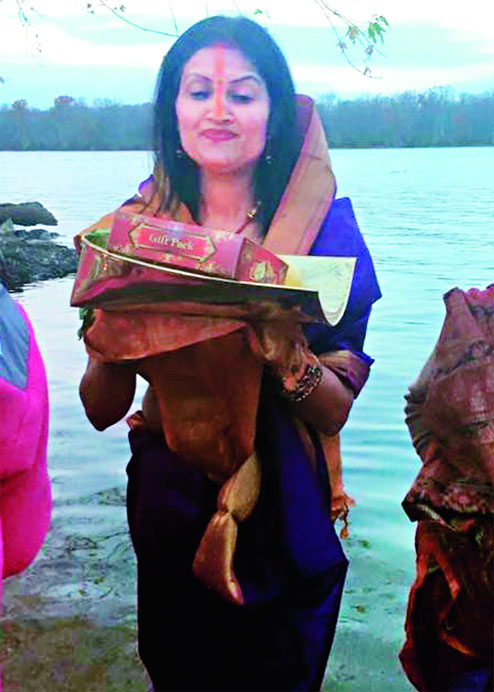
For the past three years, Vidya Mishra (50), a manager at Mariner Bank in Maryland, US, has been praying to the Sun God braving all odds.
Every year when Vidya observes Chhath in the Potomac river near Washington DC, the temperature hovers around 4-5°C but that doesn’t deter Vidya from taking a dip in the river to complete the rituals of one of the most revered festivals.
“Bonfires are placed at a couple of places to keep the devotees warm in the chilly weather conditions. Sometimes, the cold is bone-rattling; the temperature hovers around 0°C but then we have to complete our rituals. So we don’t think too much of the cold but focus on the rituals,” said Vidya, adding that she was observing the festival along with four other women on the Potomac riverbank.
So how did this US-based banker start observing Chhath? Vidya said she wanted to pay back to Chhathi Maiya who took care of her children when she left them with her parents for a short period.
“My parents belong to Bettiah in West Champaran. I have seen my mother (Hira Jha, a homemaker) observing the long and painstaking preparations for the festival from so close that I was excited about this from the very beginning. When my husband and I were moving to the US in 1999, I had to leave my children Neha and Varun with my mother for sometime.
While Neha was nine-years old then, Varun was eight. I still remember the day. I left for US after paran (breaking of the fast) of my mother who had observed Chhath. That day, I thought that I would start observing Chhath if my children would be safe at my mother’s place. I knew my children were safe as they were with my parents but then you know any mother would be worried, so my condition was also like that. So when I brought my children to the US and they were all fine, I again vowed to observe Chhath,” said Vidya.
But it took time for Vidya to get confidence to start doing the puja. “I was somewhere scared that if I miss any of the rituals or commit a mistake, it would not be good. Chhath is considered one of the strictest festivals. You pray to the Sun God and you are not supposed to touch anything dirty and you are supposed to abide by all rituals. My mother and grandmother used to say that one has to be very careful in following Chhath rituals otherwise the Sun God would be angry. Three years ago when I started observing the festival, I could inform my mother back home in India that I started doing Chhath only after I took kharna prasad. Earlier, my mother would always tell me that I would not be able to perform the rituals side by side with my job,” said Vidya, adding that her friend Jyoti Mishra, another Chhath devotee from India, helped her observe the rituals in her first year.
Vidya’s mother was right; it was not easy for the banker to perform the four-day stringent rituals as she had to travel around 70 miles (113km) from her place to offer arghya to the Sun God. “The place where I perform arghya is called Algonkian Park in Virginia that faces the Potomac river. We don’t get leave for Chhath. On the third day, when devotees have to pay arghya to the setting Sun, I leave office a little early so that I can go to the riverbank to observe the rituals. On the fourth day though, I take leave. Performing the fourth day’s rituals becomes a little tough because I have to leave home by 3am so I can reach the Potomac river by 4am. I drive 70 miles to reach the place during my fast and then there is the chilly weather condition. The river water is so icy cold but I have to follow the rituals,” says the banker.
The festival is steeped in tradition and requires paraphernalia which is not easily available, especially to those who are staying away from their native place. For Vidya also, getting raw turmeric, ginger, mango wood and soop (made of bamboo in which various offerings to the Sun God are kept) is not very easy. So how does she manage?
“I go for online shopping for the articles and then look out for acquaintances who are coming from India to the US. I tell them to bring the puja stuff. As far as bamboo-made soop is concerned, if I don’t get it, I alter it with a bamboo basket. My husband Hemakant Mishra makes all the arrangements. We have also been lucky enough to find a Bihari pandit (priest) here who assists us with the rituals,” says Vidya.
For Vidya, what is particularly fulfilling is that the community, friends and families get together and help vratis (devotees) make the festival a grand success. “From heating up the tent, lighting up bonfires, lighting arrangements to making prasad, the whole community works together to make the festivities grand. This is one festival which unites all,” sums up Vidya.











